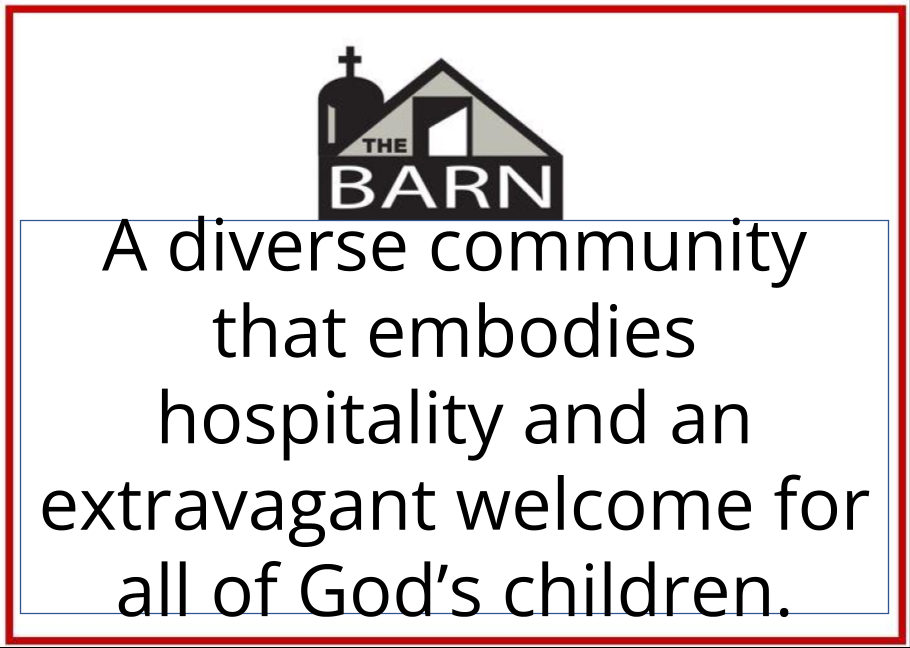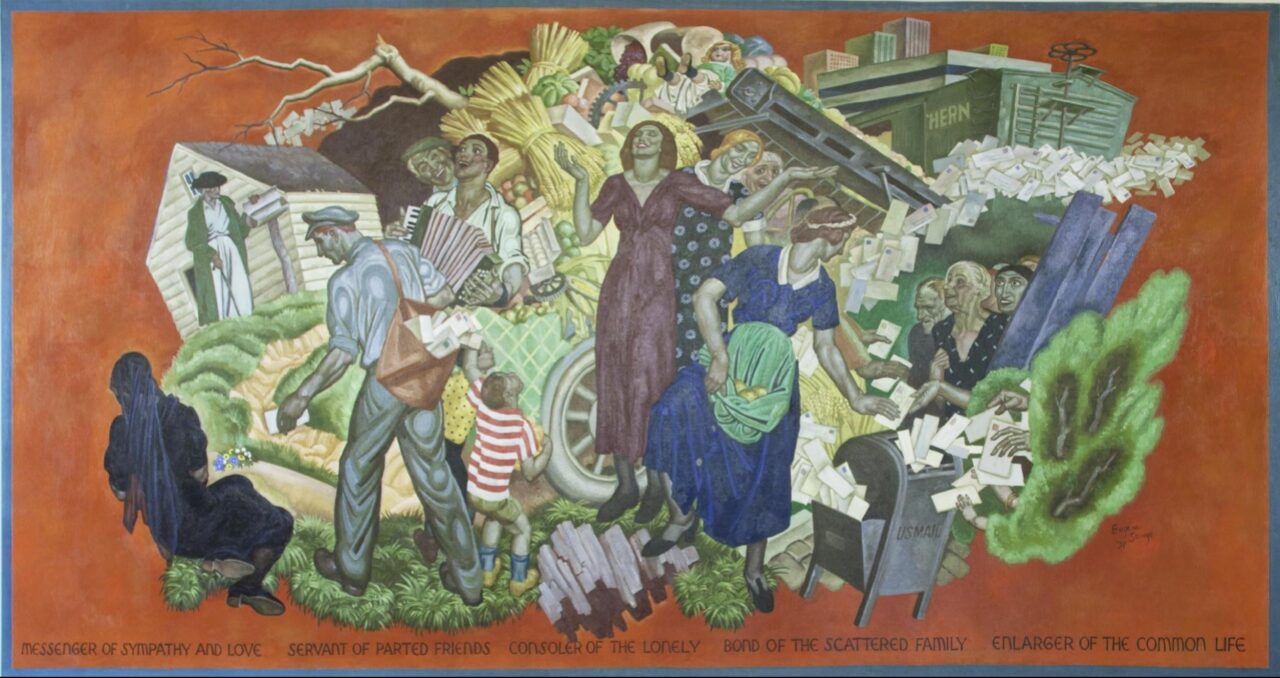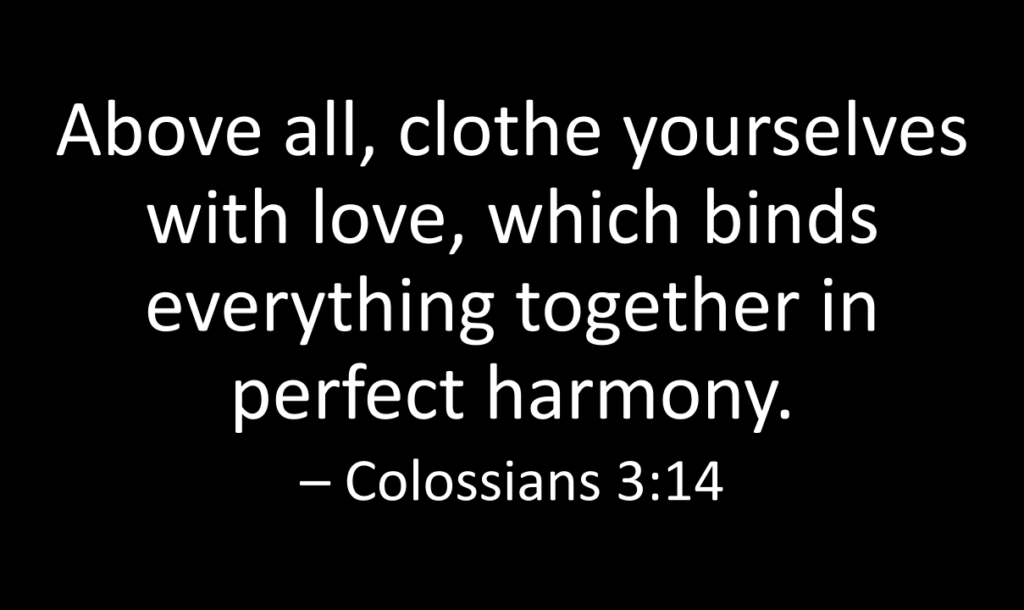Forgiveness
This is the first Sunday in this series called Linked By Love, where we are going to be focusing on some gospel passages of Jesus so we can hear what Jesus says and some other passages out of the epistles that remind us of who we are to be.
I went down a rabbit hole in Google and I ran into The Barn, a congregation near Allentown that’s led by a UCC pastor.

I read their About Us Story and I want to read you the short version of their story. They write The Barn began as a place where a diverse group of people could come together in a sacred space that encouraged and welcomed questioning, exploration, creativity, loving relationships, open communication, various opinions and mutual respect. It was a purposeful invitation for people who were open to God to come into an exploration of God into a safe space where people could disagree in love, where all people were valued as a child of God, where perspectives and worldviews were viewed with mutual respect. Where everyone was encouraged to be a teacher and a learner and a place where all were encouraged to be genuine, creative, expressive, and active participants.
When I read that, I said to myself, “I want to be in that church!” Then, I said, “WE can be that church!”. That’s what our mission and vision lead us to. We can be that. We’re not there yet. But we can go in that direction. That can be our aspiration.
Today, we’re to talk about bearing with one another.
When I took Colossians 3:12-17 to the worship commission, I remember when we read this one, they were said “Well, the whole thing is good.” The whole thing is this is one of these feel good scriptures, right? That’s who we need to be. But I said, “Yeah, but what is the one verse that we need to focus on the most?” That is the scripture that’s on the top of your bulletin, way back in the beginning, it’s verse 13. “Bear with one another and, if anyone has a complaint against another, forgive each other; just as the Lord has forgiven you, so you also must forgive.”

We tend to talk about forgiveness a lot in the church. But here’s my concern. I’m not sure that we all know what that means or how that feels. I’m not sure that we really know what forgiveness is about. I question how many of us actually need to forgive ourselves because we can’t forgive others. If we have not forgiven ourselves, if we hold guilt and shame about something we have done, or use the old confessional language, something we have done or something we have left undone, then we have to clean up us first. We have to do our work.
The church, we just talk about needing to forgive others. It’s lofty and it sounds wonderful. It is wonderful because when we really experienced forgiveness, we will find a peace within ourselves that is like nothing else in the world. But we can’t have that or share that with anyone else until we find it ourselves. So the first thing we have to do is work on ourselves.
I’m going to use the words ‘Protestant Oppression’. What that means is that the Protestant church has taught to try to shut down emotions. Growing up, emotions were not allowed in my house unless it was joy. For you younger ones think of Inside Out. Think of the first Inside Out movie where joy has to be in charge. It has to be joy or nothing. That’s problematic because we do get angry, but we feel anger, we feel hurt, we feel pain, we feel shame and guilt and all of those things. But if we don’t do something with it, then it stays in us. If we don’t direct it correctly, it’ll come out sideways and embarrass us or hurt someone that we don’t want to hurt.
I’m also going to tell you today, that I want you, when you feel something hard, when you get hurt or when you realize you’ve hurt someone else or done something you wish you hadn’t done, I want you to go through that emotion.
What I mean, I want you to really feel it in your body. I was never taught, nor did I teach my children. They’re learning through their therapists as I am learning through mine, how to go through these emotions. But you know what? There is nothing that has ever been hurt by stomping your feet as hard as you can or laying on your bed and kicking your legs, or punching the pillow, or punching the mattress. You can even, for those of you that feel like that’s a bit too much, too much feeling too quick, if you clench every muscle in your body and then let go, you will get an immediate release.
That’s about letting go of these hard emotions. Letting go, because we have to, we have to get rid of those before we can start to feel the peace within ourselves. Here’s the next big thing. This is the key to everything.
Hurt People, Hurt Others.
We need to remember that about us. When we’re hurt, we have the potential to do damage to others. When we are hurt by someone, we need to remember this, because that’s where we’ll find our compassion. I believe that very much. I think that’s at the heart of this. Jesus was about compassion and love. Which again, is like forgiveness. It sounds lovely, and it’s high ideals. But to help us get there, this is the key. I’d like you to write it down, because I want you to remember it. I actually heard it as, “Hurt People, Hurt People.” But I’m going to say “Hurt People, Hurt Others” because I’ve seen dogs hurt and I’ve seen other things hurt.
We have to be healthy and we have to remember that those who do damage are hurt. I thought about this this morning as I was getting ready. I thought, what am I missing? Am I missing anything that was in the news that I should be addressing?
Two shootings, school shootings.
I need a moment of compassion before I speak. A hurting person in Kentucky firing at the interstate randomly. We have to remember “Hurting People, Hurt Others.” That’s where we’ll find our compassion.
All that being said, now I’m going to say, forgiveness is not forgetting. That is a bad cliche that is done more hurt than anything. Forgiveness is not about forgetting. People have to be held accountable for what they have done. For the hurt they have caused. But we have to remember as we hold them accountable that there is a reason that we may not know yet. We may never know. They may not know if they’re not self aware of what’s going on inside of them.
Not the sermon you expected to find today, was it? But I need to remember, when I encounter people that are hurt, or people that are hurting others, I need to remember this. Because that’s where I’m gonna find the love. Because this bearing with one another, means “When you hurt me, I have to still love you because we’re together.”
This is the work of the gospel, and it needs to not just be in our heads. It needs to be lived.
We need to do this in our lives, with our lives, with the people in our lives. I looked up this scripture in the message. Cause I love the way Eugene Peterson kind of cuts to the chase on something. The one verse that I loved is Colossians 3:15. He made none of this going off and doing your own thing. It’s not about I’m mad, so I’m going to take my toys and go home. That’s not the work of the gospel. The work of the gospel is, “Wow, you hurt me and we need to figure out how we’re going to go forward together in a relationship.”
That kind of stuff I think happens in marriages a lot. We’ve got to figure it out. We’ve got to figure out how we’re going to live together. Through it all, the other important verse is Colossians 3:14. So once you’ve dealt with the emotions, close yourself with love, which binds everything together in perfect harmony.

That’s who Christ wants us to be. We know, and God knows. God knows that we are not perfect. This Bible, sometimes we just look at this and we talk about all the wonderful things God tells us in it, but it also is full of people, not just Peter, because I do like to pick on Peter, but it is full of people who hurt others. Who made mistakes, big ones. Jonah jumped in the sea to get away from God. God laughed, had him swallowed and spit him out on the shore where he needed to be. It’s full of those. We got to remember that this is the good news.
God doesn’t get mad at us when we make mistakes. God doesn’t get mad at us when we fail, because all of our mistakes and failures are meant to help us grow. What God hopes for us is that we will grow into mature disciples. We can’t just stick with what we heard in Sunday School and Kindergarten. We got to take this and take it seriously and go deeper with it.
So the question is, is there something that you need to forgive yourself for?
Because if there is, you need to find someone you can trust and tell them you need to confess it. Has to be somebody you trust. It has to be somebody you know isn’t going to use it against you. Isn’t going to tell the rest of the community. Isn’t going to make a show of it. But you need to tell them. Because you need someone who’s going to hold you accountable. So you don’t do it again.
To redeem mistakes, we have to name it. We have to learn from it. And we have to protect it. Not do it again. That’s redemption. That’s forgiveness. That is love. May it be so